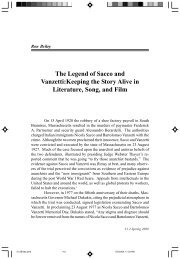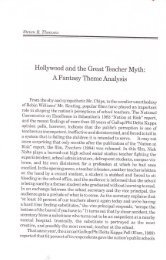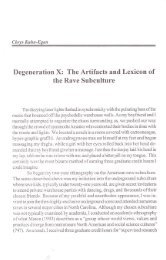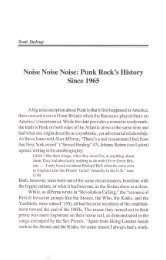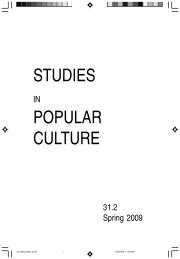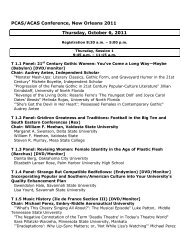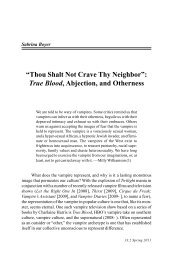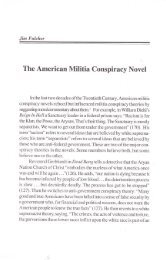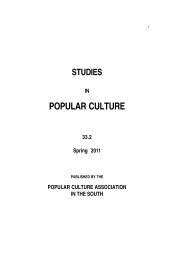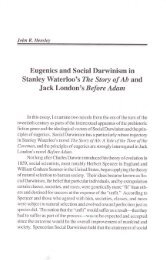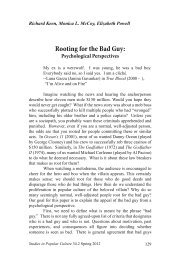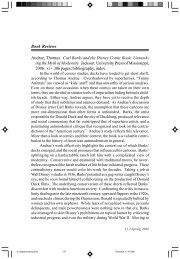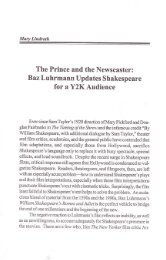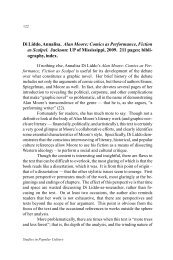Adapting Shakespeare for Star Trek and Star Trek for Shakespeare ...
Adapting Shakespeare for Star Trek and Star Trek for Shakespeare ...
Adapting Shakespeare for Star Trek and Star Trek for Shakespeare ...
Create successful ePaper yourself
Turn your PDF publications into a flip-book with our unique Google optimized e-Paper software.
The Klingon Hamlet <strong>and</strong> the Spaces of Translation 51<br />
The “Klingon restored versions” of Hamlet <strong>and</strong> Much Ado About<br />
Nothing mark a particular re-incarnation of <strong>Shakespeare</strong>’s afterlife <strong>and</strong><br />
also, one may add, that of the <strong>Star</strong> <strong>Trek</strong> franchise. By adapting <strong>Shakespeare</strong><br />
<strong>for</strong> <strong>Star</strong> <strong>Trek</strong> <strong>and</strong> <strong>Star</strong> <strong>Trek</strong> <strong>for</strong> <strong>Shakespeare</strong>, they provoke reflection on the<br />
dynamics <strong>and</strong> politics of the processes of translation, adaptation <strong>and</strong> rewriting.<br />
In a playful <strong>for</strong>m of <strong>Shakespeare</strong>’s Klingon identity, they bring <strong>for</strong>th the<br />
problems of the contested relationship between the original <strong>and</strong> its version,<br />
of the enactment <strong>and</strong> effacement of the difference in a translated text, of<br />
the inescapable alienation of the self <strong>and</strong> the other in translation. But at the<br />
same time, in the words of Lawrence M. Schoen’s Preface to The Klingon<br />
Hamlet, they remind us that reading is ultimately an exercise in “wilful<br />
suspension of disbelief,” 49 in accepting the author’s reality as actuality. If<br />
“translation is the most intimate act of reading,” 50 it is also necessarily a<br />
play of “make believe”: belief in the author’s presence, the translator’s<br />
transparency, <strong>and</strong> the illusion of absolute translatability. The Klingon translations<br />
give evidence of how the popular culture, with its re-enactments or<br />
reinterpretations of the official or high culture texts <strong>and</strong> practices, helps to<br />
uncover the mechanisms of cultural <strong>and</strong> linguistic alienation <strong>and</strong> re-appropriation,<br />
while posing the boldest challenges to its audience’s ability to suspend<br />
disbelief.<br />
Karolina Kazimierczak<br />
University of Aberdeen, Scotl<strong>and</strong><br />
Acknowledgements<br />
This work would not have been possible without generous help from<br />
Klingon fans. I am indebted to the members of, thlIngan Hol <strong>and</strong> the Klingon<br />
language mailing lists, <strong>and</strong> of the Internet messageboard: Klingon Imperial<br />
Forum, <strong>for</strong> kindly accepting my presence among them; <strong>and</strong> to other<br />
Klingonists <strong>for</strong> sharing their insights <strong>and</strong> experiences. I want to thank my<br />
supervisors, Professor Lucy Suchman <strong>and</strong> Dr Yoke-Sum Wong from the<br />
Department of Sociology at Lancaster University <strong>for</strong> their guidance during<br />
my doctoral research <strong>and</strong> help in shaping the arguments <strong>for</strong> this essay.<br />
32.2 Spring 2010



